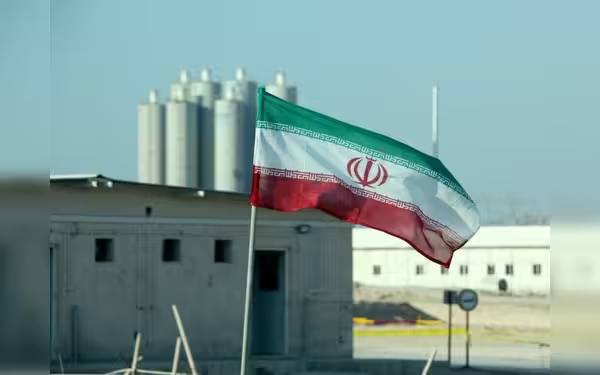Saturday, November 16, 2024 08:26 PM
Iran Willing to Negotiate with IAEA, Rejects External Pressure
- Iran expresses willingness to negotiate with IAEA.
- Foreign Minister emphasizes negotiations must align with national interests.
- Tensions rise as EU pushes for new resolution against Iran.
 Image Credits: brecorder
Image Credits: brecorderIran expresses readiness to negotiate with IAEA but insists on no external pressure amid rising tensions.
In recent developments, Iran has expressed its willingness to engage in negotiations with the International Atomic Energy Agency (IAEA) regarding its nuclear program. However, Iranian officials have made it clear that they will not yield to external pressure. This statement comes after a meeting between Iran's Foreign Minister Abbas Araqchi and IAEA chief Rafael Grossi in Tehran. The backdrop of these discussions is marked by increasing tensions, particularly as European powers are advocating for a new resolution against Iran due to what they perceive as inadequate cooperation from Tehran.
The situation is further complicated by the political landscape in the United States, where Donald Trump is set to assume the presidency again in January. During his previous term, Trump withdrew from the 2015 nuclear agreement, which was designed to limit Iran's nuclear activities. The uncertainty surrounding Trump's approach to Iran's nuclear ambitions adds another layer of complexity to the ongoing negotiations.
Foreign Minister Araqchi emphasized that the "ball is in the EU/E3 court," indicating that Iran is open to discussions that align with its national interests and rights. He firmly stated, "Willing to negotiate based on our national interest and inalienable rights, but not ready to negotiate under pressure and intimidation." This sentiment reflects Iran's desire to maintain its sovereignty while navigating international expectations.
Relations between Iran and the IAEA have been strained due to several unresolved issues. Notably, Iran has restricted access to its uranium-enrichment facilities and has not adequately addressed the presence of uranium traces at undeclared sites. The IAEA has reported that Iran continues to produce highly enriched uranium, raising concerns among Western nations about the potential for nuclear weapon development.
In a joint press conference, Grossi urged Iran to take constructive steps to resolve outstanding issues, stating, "It is in our power here to take concrete steps that will indicate clearly, to the U.S. and the international community, that we can clarify things and move forward with concrete solutions." This call for cooperation highlights the importance of dialogue in addressing the nuclear impasse.
As the IAEA prepares for its upcoming meeting, Iranian officials have warned that any resolution against Iran could lead to a reduction in diplomatic and technical cooperation with the agency. This potential escalation underscores the delicate balance that must be maintained in international relations, particularly concerning nuclear non-proliferation.
The ongoing negotiations between Iran and the IAEA represent a critical juncture in international diplomacy. While Iran is open to discussions, the insistence on negotiating without pressure indicates a firm stance on its part. The outcome of these talks will not only impact Iran's nuclear program but also shape the broader geopolitical landscape. As the world watches closely, the hope remains that rational dialogue can pave the way for a peaceful resolution to this complex issue.













